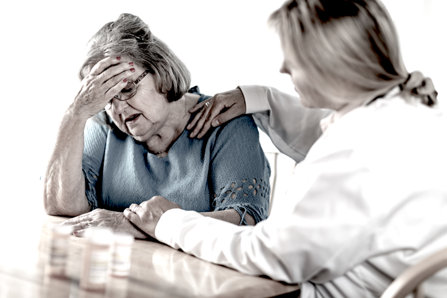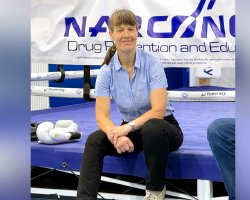How Much Do Doctors Actually Know About Addiction?

A disparity exists in our health and medical sphere here in the United States. On the one hand, we have one of the absolute best health systems in the world. But on the other, we are struggling with a massive addiction epidemic to drugs and alcohol.
The key factor of this has been the fact that our country is experiencing what might be the worst drug and alcohol addiction epidemic it has ever experienced in recorded history, but our nation’s medical doctors are wholly unprepared to address this problem.
Dr. Timothy Brennan, director of the addiction medicine fellowship at Mount Sinai Health System put it pretty eloquently, saying that trying to combat the 21st-century drug addiction epidemic with the current provider workforce was “Like trying to fight World War II with only the Coast Guard.”
So what is going on here?
Doctors Are More or Less Unprepared to Contend with Addict-Patients
Patients in the thousands appear in front of their doctors every day with suspicious symptoms that point to addiction. This occurs in every subset of health, from internal medicine to orthopedics, geriatrics, cardiology, family medicine, etc. One would think that addressing chemical dependence on substances and psychological reliance would be “just another task” that doctors would have to contend with. However, our medical community is actually grossly underprepared to contend with the 21st-century drug addiction epidemic.
And this is a big scare, to say the least. According to the Centers for Disease Control and Prevention, we are currently losing about six-hundred and thirty-two thousand Americans to tobacco, alcohol, and drugs, every year. According to the National Center on Addiction and Substance Abuse, the medical community has failed to properly address addiction, and that has to change.
The condition is starting to change. But it is happening too slowly. Much too slowly. At this time, there are only fifty-two addiction medicine fellowships in the United States. By this is meant that there are only fifty-two private, medical practices that specialize in addiction medicine. To put that number into perspective, there are a whopping two-hundred and thirty-five accredited programs in sports medicine.
Let’s put that into even more perspective. According to the National Institute on Drug Abuse, there are twenty-four million drug users in the United States who need specialized care. Conversely, there are only about four-hundred and eighty-thousand professional athletes in the United States, according to the National Collegiate Athletic Association. So there are about fifty times more addicts in the U.S. than pro athletes, yet there are four times as many health programs for athletes than there are for addicts. There is something very wrong with that picture.
Does a Medical Student Get Educated on Addiction?

When we look at problems in the medical community, we should roll the tape back a bit, and look to what might have caused that disparity. So the real question is, are our doctors actually getting educated on the subject of drug and alcohol addiction? Not as much as they should be.
According to the Addiction Medicine Foundation, about one-hundred and eighty medical schools are now beginning to integrate education about opioids into their curriculums. But only fifteen of the one-hundred and eighty include educational segments on alcohol, tobacco, and other drugs. Opioids might be the biggest threat to our nation in the addiction sphere, but it is only one of many threats.
Currently, Boston University sets the gold standard of addiction education, teaching medical students about addiction in all four years that such students will be in attendance. Furthermore, Boston University even role-plays medical students with paid actors who pretend to be patients seeking help for physical pain. The students must carefully gauge the “patient’s” requests, demeanor, attitude, “medical history,” and many other factors to determine how to address that “patient’s” medical situation.
But few other medical schools even come close to Boston University’s approach, and that is a shame. Actually, it’s more than a shame, it’s unacceptable that, in light of an almost twenty-year-long drug addiction epidemic, that all medical schools have not yet adjusted their curriculums to train up-and-coming doctors to contend with the epidemic.
Why it is Difficult to Train Med Students on Addiction
Let’s play the Devil’s Advocate for a minute here, and let’s try to explore why medical schools might be more than a little behind the times on getting some degree of comprehensive education in place on drug addiction and alcoholism.
For one, hours of training at most medical schools have already been meted towards educating med students on the opioid epidemic. Increasing the level of that education to span other types of addiction would tax an already taxed course schedule, and the end result would be that medical schools would have to decrease education in another area of medicine entirely. We can play the advocate for a minute here and say that no one wants the job of deciding which areas of medicine need to be taught, and which should be minimized or even left completely by the wayside.
Another problem here is that addiction medicine is an incredibly young subject. Normally, if a medical school wanted to start teaching a new subject, the school would call in “fellows,” i.e. post-graduate students who already had specialties in that area. Those post-grads would come to the med school and provide consultation, they would help educate the students, and they might even assist in developing the curriculums themselves. However, addiction medicine is a young subject and there simply are not that many experts in the field to assist schools in creating addiction medicine curriculums.
“The biggest challenge now is how do you sustain it? Who keeps updating it? When faculty leave, who will replace them?…”
According to Dr. Daniel Alford, one of the professors and an associate dean at Boston University, “The biggest challenge now is how do you sustain it? Who keeps updating it? When faculty leave, who will replace them?” His sentiment is mirrored by every other medical school that is attempting to implement education on addiction into their standard curriculums.
The Need for Addiction Medicine as a Required Sphere of Knowledge

No matter the obstacles in the way of implementing a change in our medical practice and educational system, we absolutely must change this old, outdated approach. We need to stop looking at addicts like they are second-class citizens, unworthy of standard medical care. And we need to break away from the old concept that treating addiction is not apart of expected medical practice. That is not the case.
In the United States, there are about eight-hundred thousand to one-million practicing doctors at any given time. If we could get all of them fully informed and educated and competent in addressing addicts, then all each doctor would have to do is treat twenty-five to thirty addicts (there are about twenty-five million addicts in the U.S.), and we could really do something about the addiction epidemic.
Obviously, there are many other factors involved, e.g. addict willingness to get help (which is often very, very absent), addict’s access to a doctor, insurance coverage, self-pay funding, physical condition to receive treatment, types of treatments available, etc. but the basic concept is sound. Our doctors have to know how to identify and refer the addict and their family to a competent treatment professional for help addicts. Addiction is not a disease from which one can never recover and the medical doctor should be able to acknowledge that there are licensed, trained, professional alcohol and drug counselors specifically trained and certified to treat an addict; just like they are trained and licensed to treat physical ailments. That’s all there is to it.
Sources:


 ®
®